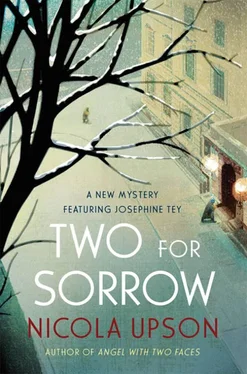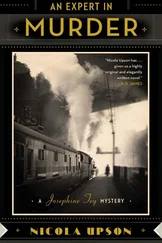‘A day out by the seaside and some idle gossip are hardly enough to warrant an arrest, though.’
It sounded thin, even to Penrose’s ears, but he pressed on. ‘Not in themselves, perhaps, but taken together with Celia Bannerman’s lies and the fact that she was on the scene at Lucy’s accident, I think we have enough to bring her in for questioning.’
‘Has Bannerman got any connection to this Baker girl other than having her frock made?’
‘No, but her father …’
‘And has she an alibi?’
‘A partial alibi.’
‘But there’s absolutely nothing to put her at the scene after two-thirty that afternoon, when she readily admits to being there?’
‘No, but she has a history with the family …’
‘And that’s all it is, Penrose—a history. What about the girl’s mother? Am I right in thinking that she has no alibi for the murder, that she was on bad terms with her family, and that she and Marjorie had been fighting in the street? Or did you make all that up just to pad out your report?’
‘Of course not, Sir.’
‘Then I suggest you concentrate on the woman you already have in custody and get a result before some do-gooder from a welfare organisation starts suggesting that we’re hounding the socially disadvantaged without good cause.’
‘I questioned her again this afternoon when I got back from Walberswick, Sir.’ He omitted to say that the interview had consisted mostly of questions relating to Eleanor Vale and Celia Bannerman, and that it had got him nowhere; if Jacob Sach and Marjorie knew something about that relationship, they certainly hadn’t shared it with anyone else in the family. Fallowfield had still been unable to establish a clear alibi for Edwards but, whilst this was a blow to the sergeant’s professional pride, it created no problematic doubts for Penrose: after the interview, he had taken her downstairs for the formal identification of Marjorie’s body and there was no question in his mind that her grief—which seemed to have gained strength from being denied for so long—was genuine. She had touched her daughter’s bruised and violated lips with a tenderness which Penrose doubted she had ever expressed while Marjorie was alive and, of all the regrets which he saw pass across her face, remorse at having killed her was not one of them. ‘The truth is we don’t have any good cause to keep her here,’ he said as patiently as he could. ‘I really don’t think it’s her.’
‘But you don’t know it’s not. You seem to be confusing the issue, Penrose. I asked you to take a look at the Cowdray Club because of some anonymous letters and a spate of petty thefts; I did not ask you to investigate the private lives of its members, and in particular of its secretary.’
‘I think they’re connected, though.’ It was a half-truth; he agreed with Fallowfield that Sylvia Timpson was likely to be behind the spiteful letters, driven by bitterness about her own abandoned career, but that didn’t exclude the possibility that Bannerman had received a threatening note from a different source. ‘Marjorie delivered two letters to the club on Friday morning,’ he explained, ‘and only one of them was from my cousins—I’ve checked that. I think Marjorie wrote the other one herself and challenged Celia Bannerman to …’
‘Can you prove that?’
‘Not yet, sir, but it seems reasonable to assume …’
‘It’s not reasonable to assume anything when you’re dealing with something as sensitive as this. I hope to God you haven’t been stupid enough to tell anyone else what’s in your mind. When I asked you to look into the matter, I told you to be discreet.’
‘To be fair, Sir, we weren’t investigating two murders at that stage. Sudden death does rather limit the opportunities for discretion.’
He knew he’d pushed his luck too far: sarcasm was never the right tack to adopt with the chief constable, and certainly not with an issue that contained such a strong political subtext. ‘Do I need to remind you, Inspector, that the murders to which you refer happened half a mile away on someone else’s premises?’ The rank was spoken in such a way as to suggest that it was a temporary arrangement which could easily be dissolved. ‘Premises owned by your family, in fact. Perhaps I should take you off this case. The fact that one of the victims was your cousins’ employee creates an obvious conflict of interests.’
The comment wasn’t worth addressing seriously and Penrose ignored it; he was arrogant enough to realise his value to the force, and he knew that the Chief would never risk insulting his integrity without a better reason than the one he had just given. ‘But Lucy Peters wasn’t half a mile away, Sir.’ He had checked regularly on the girl’s condition with Miriam Sharpe and there had been no marked improvement; she may have survived the immediate trauma but, as Sharpe had warned him yesterday, there was still plenty to worry about. ‘She was well and truly on the Cowdray Club premises.’
‘And she fell down the stairs. It’s all very tragic, I agree, but it can’t be helped.’
‘But just suppose for a moment that I’m right, Sir. Peters is in danger, because the killer will try again.’ He was careful to avoid using Bannerman’s name; it would only antagonise his superior even further. ‘Do we really want to risk that? A young girl’s death caused by our negligence—that really would be a scandal.’
‘You’ve got a man posted outside her room around the clock, haven’t you?’
‘Yes, of course.’
‘Then I don’t quite see your problem.’ The Chief hadn’t met Celia Bannerman in Lucy’s room and seen the fear in her eyes, Penrose thought; the longer Lucy survived the accident, the more desperate Bannerman would become. ‘Look, I understand what you’re saying to me and normally I admire your flair—you know I do.’ Penrose accepted the condescension through gritted teeth, but he knew that the battle was over for now. ‘This time, though, I honestly think you’ve got it wrong. There’s the gala tomorrow night to consider, and the minister’s going to be there. I really can’t allow you to make waves unless you’ve got the facts to back it up. Go back and talk to Baker or Edwards, or whatever her name is.’
Penrose knew that he could talk to Edwards until he was blue in the face, but the answer would still be the same: she hadn’t killed her daughter or her husband. Understanding now exactly how Miriam Sharpe felt about society getting in the way of the job, he tried one more shot. ‘And if I can bring you evidence that Bannerman is involved somehow?’
The chief constable looked at him as though he were a weapon which had fallen into dangerous hands. ‘Then of course I’ll allow you to bring her in,’ he said cautiously. ‘Good God, man, we’re not in the business of hushing things up. But don’t waste time that should be spent on the Baker woman, and if you can get a confession out of her before tomorrow night, it would reflect well on us all.’
Never mind that it’s the wrong one, Penrose muttered to himself, but he recognised a dismissal when he heard one. ‘I’ll do my best, Sir,’ was all he could manage to say with any degree of courtesy.
‘And you’re at the gala tomorrow night?’
‘Yes, Sir. I wouldn’t miss it for the world.’ He smiled, enjoying the nervous expression on his superior’s face.
‘Then I hope I can rely on you to put on a good show. There’ll be lots of important people there, and it wouldn’t do your career any harm to make a good impression. No nonsense, Penrose.’
‘Of course not, Sir.’ Still seething, Penrose shut the door behind him and went to look for Fallowfield. Perhaps the chief constable wasn’t entirely wrong after all, he thought, remembering the half-finished evening cloak which Marjorie had been working on for Celia Bannerman: a good show tomorrow night might be exactly what was needed.
Читать дальше












